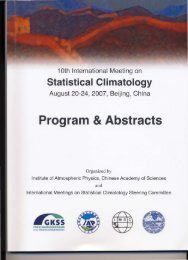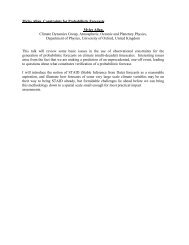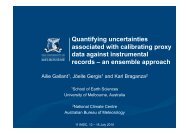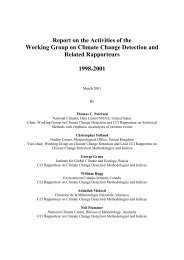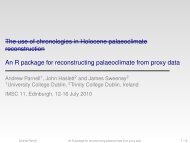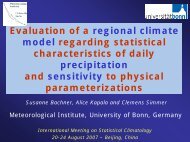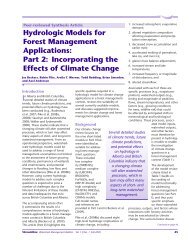The tenth IMSC, Beijing, China, 2007 - International Meetings on ...
The tenth IMSC, Beijing, China, 2007 - International Meetings on ...
The tenth IMSC, Beijing, China, 2007 - International Meetings on ...
Create successful ePaper yourself
Turn your PDF publications into a flip-book with our unique Google optimized e-Paper software.
Empirical probabilistic seas<strong>on</strong>al forecasts for Canada<br />
Speaker: V. Kharin<br />
V. Kharin<br />
Canadian Centre for Climate Modelling & Analysis<br />
Slava.Kharin@ec.gc.ca<br />
A method for c<strong>on</strong>structing empirical deterministic and probabilistic seas<strong>on</strong>al forecasts<br />
in Canada is proposed. <str<strong>on</strong>g>The</str<strong>on</strong>g> performance of the empirical forecasts is evaluated and compared<br />
to the performance of a multi-model ensemble of seas<strong>on</strong>al hindcasts produced with four global<br />
numerical models. Special attenti<strong>on</strong> in developing and validating empirical forecasts is paid to<br />
avoiding artificial skill enhancement. <str<strong>on</strong>g>The</str<strong>on</strong>g> 20th century empirical seas<strong>on</strong>al hindcasts of near<br />
surface temperature in Canada are best skillful in colder seas<strong>on</strong>s for time leads up to several<br />
m<strong>on</strong>ths. Little skill is found in transient seas<strong>on</strong>s. One-m<strong>on</strong>th lead empirical seas<strong>on</strong>al<br />
forecasts are competitive to the corresp<strong>on</strong>ding numerical model seas<strong>on</strong>al forecasts. Seas<strong>on</strong>al<br />
precipitati<strong>on</strong> hindcasts in Canada are not very skillful.<br />
Regime predictability in an atmospheric model or analogue predicti<strong>on</strong> revisited<br />
Speaker: Frank Kwasniok<br />
Frank Kwasniok<br />
University of Exeter, United Kingdom<br />
Predictability properties of atmospheric flow are diagnosed and analysed empirically using<br />
n<strong>on</strong>linear signal processing techniques. <str<strong>on</strong>g>The</str<strong>on</strong>g> noti<strong>on</strong> of predictability is relaxed from accurate<br />
predicti<strong>on</strong> of individual trajectories to a coarse-grained view in which <strong>on</strong>ly probabilities of<br />
visiting certain regi<strong>on</strong>s of state space or regimes are forecast. <str<strong>on</strong>g>The</str<strong>on</strong>g> regimes and a probabilistic<br />
model of the transiti<strong>on</strong>s between them are determined simultaneously by fitting a hidden<br />
Markov model to a data set of the system. <str<strong>on</strong>g>The</str<strong>on</strong>g>n regime predictability is examined as a functi<strong>on</strong><br />
of initial c<strong>on</strong>diti<strong>on</strong> using the Markov model; states with particularly high or low regime<br />
predictability are identified. States with high regime predictability are characterized by a large<br />
projecti<strong>on</strong> of their posterior distributi<strong>on</strong> of regime membership <strong>on</strong>to the slowliest decaying<br />
eigenmode of the Markov model. Predictability informati<strong>on</strong> is refined by using an analogue<br />
model of the regime posterior. <str<strong>on</strong>g>The</str<strong>on</strong>g> method bears the potential of improving predicti<strong>on</strong> by<br />
combining dynamical models of the system with the present statistical model. <str<strong>on</strong>g>The</str<strong>on</strong>g> ideas<br />
outlined above are applied to the classical Lorenz system as well as an atmospheric model<br />
with realistic variability and telec<strong>on</strong>necti<strong>on</strong> patterns.<br />
79




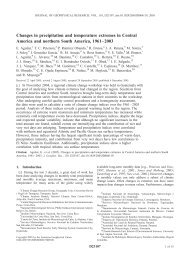
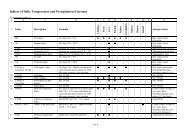
![final_program_abstracts[1]](https://img.yumpu.com/19102520/1/174x260/final-program-abstracts1.jpg?quality=85)
